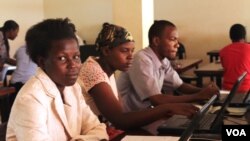JINJA, UGANDA —
One American computer hacker has figured out how to harness the knowledge and creativity of other hackers around the world to help local Ugandan charities solve their information technology problems -- for free.
For 15 years, Johnny Long was paid by governments and major firms to break into their systems and sometimes their buildings, identifying security holes. His techniques are legendary in technology circles, his books are widely read and people flock to hear him speak at conferences.
But when Long first came to Africa, he says he did not think he would have much to offer.
“I’m a high-tech guy, I hardly have any other skills. I get somebody else to change light bulbs," said Long. "I’m just not the type that you would think of going to Africa and doing anything.”
But he did know computers and he knew a lot about hackers.
“I knew that they got a bad rap from a few people that were committing crimes with their name," said Long. "I saw these people doing good things. But I realized there was no charity that was technology-based that was for them.”
Inspired by a trip his wife had taken, and determined to help, Long moved his family to Jinja, Uganda, in 2009.
There he founded Hackers for Charity, which provides a way for hackers around the world to volunteer their skills to cash-strapped local charities that cannot afford tech support. Hackers can volunteer remotely, building and securing websites or they can come to Uganda in person to help set up and maintain computer labs.
Long says the work might not be warm and fuzzy, but for many organizations it is essential. Renee Bach, who runs a charity for malnourished children, is one of the beneficiaries. She points out that computers are vital in keeping her organization going.
“We use computers for all of our data and record keeping and all of our bookkeeping and finances as well," said Bach. "We have Skype board meetings and things like that over the Internet as well. A lot of our communication with donors is done over the Internet.”
Long says persuading people to work with hackers is not always easy. The stigma attached to the term can drive donors away.
“Most organizations see that word hacker - which we won’t remove from our name, because it’s who we are - and that’s it. End of discussion," said Long. "Organizations that would normally donate to us won’t donate because they’re fearing a news story.”
He says working with hackers does come with challenges. Some of his volunteers prefer to remain anonymous, taking precautions to prevent their emails from being traced. And, he adds, identity is not the only problem.
“The other challenge is vetting the volunteers," said Long. "If you have somebody that has bad motives and they just want to put a back door into a client’s website instead of fixing it, that becomes sticky.”
Long’s volunteers have numbered in the thousands, and he screens them all carefully. Tim Rosenberg, an IT professional who has volunteered twice with Long, insists that the majority are just grateful for the chance to use their expertise to benefit others.
“We’re not known for our social skills," said Rosenberg. "We’re known for spending hours and days and months in windowless offices interfacing on laptops and computers, and not really moving outside of that bubble. An organization like Hackers for Charity, that provides the ability to start impacting into the wider community and the world, is just a phenomenal opportunity.”
Long says he hopes the work they do will change the public’s perceptions of hackers as well.
“We’re able to show hackers aren’t just about mayhem and causing trouble," said Long. "We’re actually making a difference.”
In the mean time, Long admits his own tech skills are getting a bit rusty. But he feels like he is helping to save lives and says he is not looking back.
For 15 years, Johnny Long was paid by governments and major firms to break into their systems and sometimes their buildings, identifying security holes. His techniques are legendary in technology circles, his books are widely read and people flock to hear him speak at conferences.
But when Long first came to Africa, he says he did not think he would have much to offer.
“I’m a high-tech guy, I hardly have any other skills. I get somebody else to change light bulbs," said Long. "I’m just not the type that you would think of going to Africa and doing anything.”
But he did know computers and he knew a lot about hackers.
“I knew that they got a bad rap from a few people that were committing crimes with their name," said Long. "I saw these people doing good things. But I realized there was no charity that was technology-based that was for them.”
Inspired by a trip his wife had taken, and determined to help, Long moved his family to Jinja, Uganda, in 2009.
There he founded Hackers for Charity, which provides a way for hackers around the world to volunteer their skills to cash-strapped local charities that cannot afford tech support. Hackers can volunteer remotely, building and securing websites or they can come to Uganda in person to help set up and maintain computer labs.
Long says the work might not be warm and fuzzy, but for many organizations it is essential. Renee Bach, who runs a charity for malnourished children, is one of the beneficiaries. She points out that computers are vital in keeping her organization going.
“We use computers for all of our data and record keeping and all of our bookkeeping and finances as well," said Bach. "We have Skype board meetings and things like that over the Internet as well. A lot of our communication with donors is done over the Internet.”
Long says persuading people to work with hackers is not always easy. The stigma attached to the term can drive donors away.
“Most organizations see that word hacker - which we won’t remove from our name, because it’s who we are - and that’s it. End of discussion," said Long. "Organizations that would normally donate to us won’t donate because they’re fearing a news story.”
He says working with hackers does come with challenges. Some of his volunteers prefer to remain anonymous, taking precautions to prevent their emails from being traced. And, he adds, identity is not the only problem.
“The other challenge is vetting the volunteers," said Long. "If you have somebody that has bad motives and they just want to put a back door into a client’s website instead of fixing it, that becomes sticky.”
Long’s volunteers have numbered in the thousands, and he screens them all carefully. Tim Rosenberg, an IT professional who has volunteered twice with Long, insists that the majority are just grateful for the chance to use their expertise to benefit others.
“We’re not known for our social skills," said Rosenberg. "We’re known for spending hours and days and months in windowless offices interfacing on laptops and computers, and not really moving outside of that bubble. An organization like Hackers for Charity, that provides the ability to start impacting into the wider community and the world, is just a phenomenal opportunity.”
Long says he hopes the work they do will change the public’s perceptions of hackers as well.
“We’re able to show hackers aren’t just about mayhem and causing trouble," said Long. "We’re actually making a difference.”
In the mean time, Long admits his own tech skills are getting a bit rusty. But he feels like he is helping to save lives and says he is not looking back.





